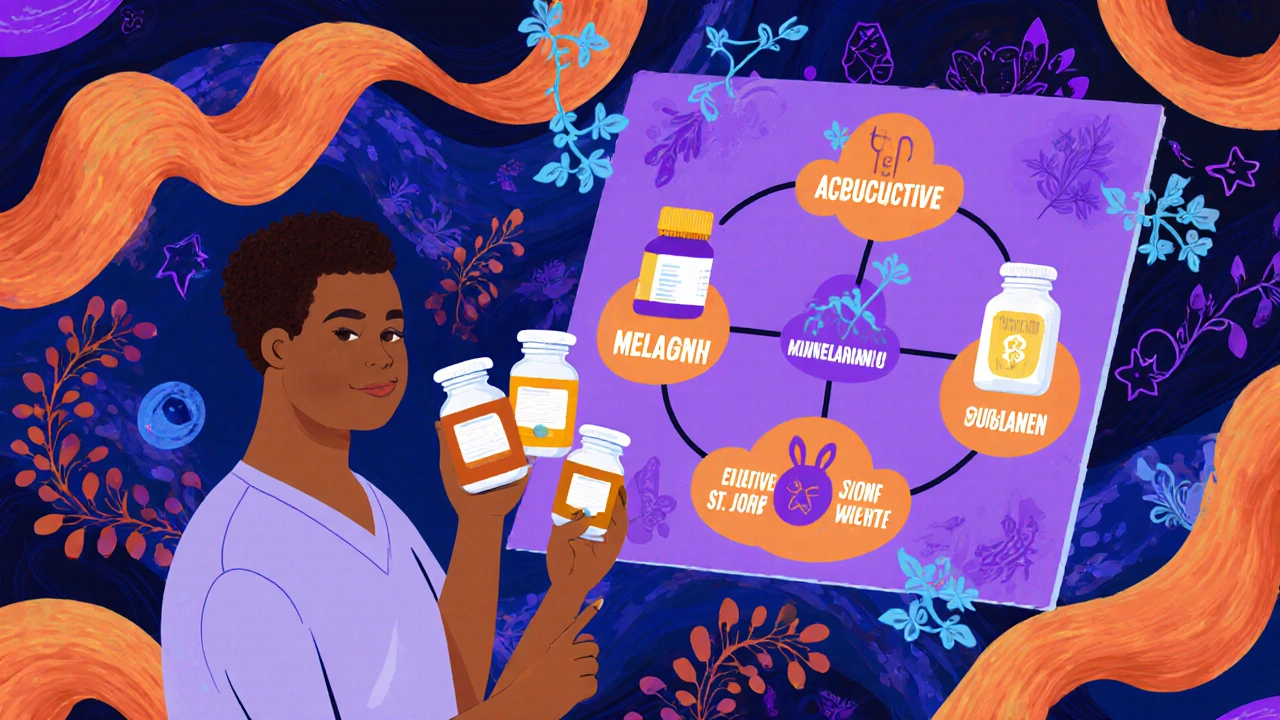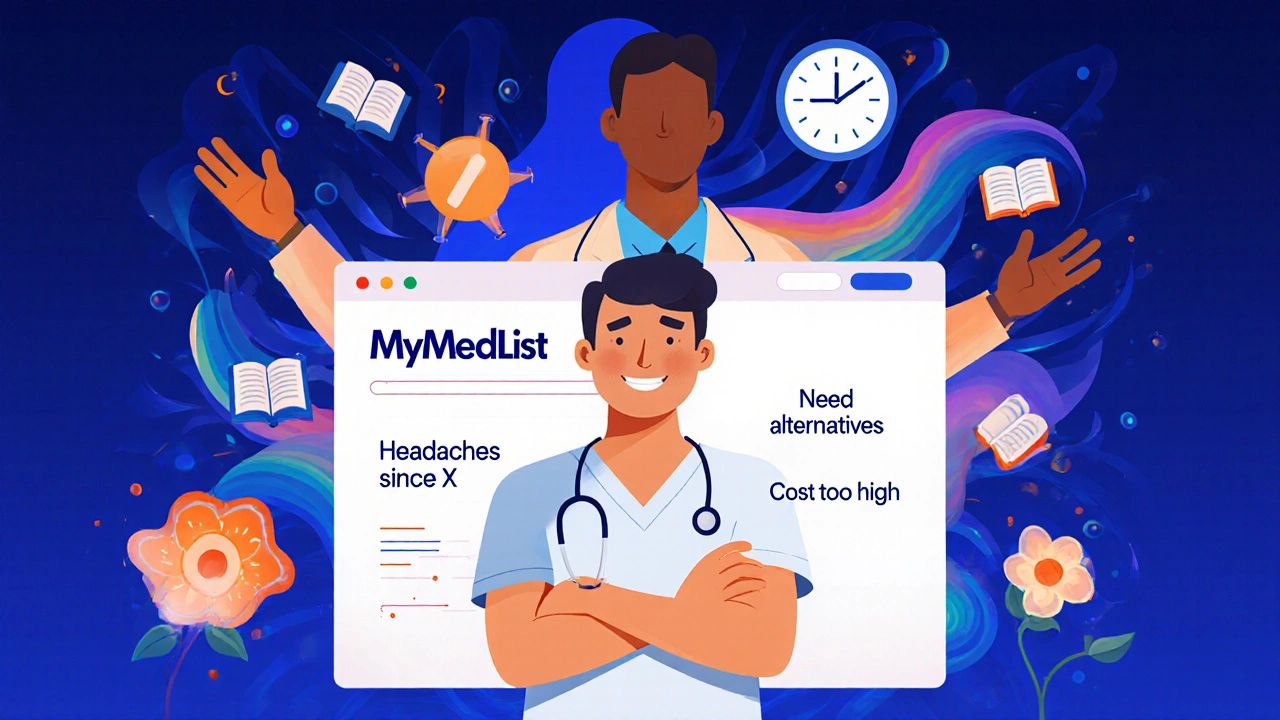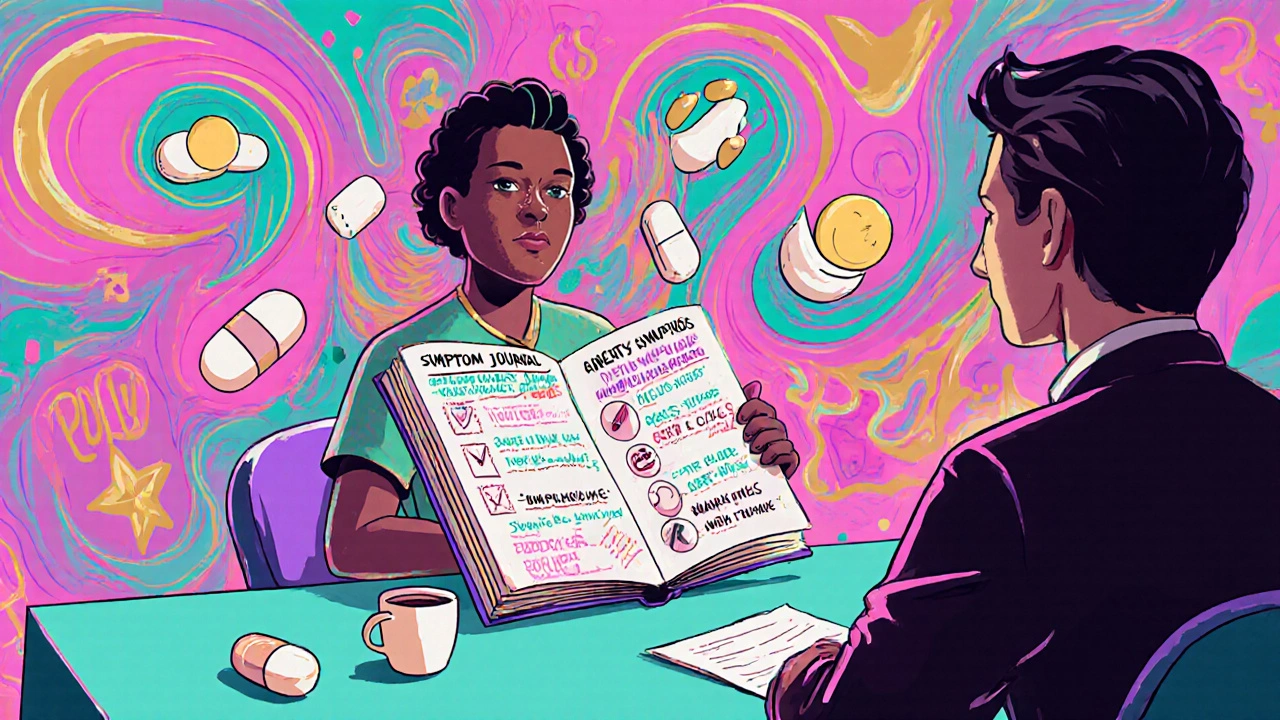When a medication isn’t working, it’s not a sign you’re doing something wrong-it’s a sign you need to talk to your doctor. Too many people suffer in silence, thinking they just have to live with side effects or no improvement. But that’s not how medicine should work. Your body, your symptoms, and your life matter. If a drug isn’t helping-or is making things worse-you have the right to ask for other options. And you don’t need to be intimidating or pushy to get there. You just need to be prepared.
Start by Tracking What’s Really Happening
Before your appointment, write down what’s going on. Not just, “It’s not working.” Be specific. When did you start the medication? What were you hoping it would fix? What’s actually happening now? Are you still in pain? Still anxious? Still having trouble sleeping? Did new symptoms show up-dizziness, nausea, brain fog?People who bring a detailed symptom log to their doctor are 68% more likely to get a meaningful change in treatment, according to University Health’s 2022 study. Try this: For two weeks, jot down your symptoms each morning and night. Note the time you took the medication, what you ate, how you slept, and any new issues. Bring that list. Don’t rely on memory. Your doctor will see you’re serious-and that you’re paying attention to your own body.
Bring Your Complete Medication List
Don’t just say, “I’m on a few pills.” Bring the actual bottles. Or a written list with names, doses, and how often you take them-including over-the-counter drugs, vitamins, and supplements. Many people forget that ibuprofen, melatonin, or even St. John’s wort can interact with prescription meds. A 2022 study found that bringing physical bottles to appointments reduces medication errors by 22%.Doctors don’t always know what you’re taking unless you tell them. And sometimes, the reason your medication isn’t working is because something else is interfering. Your pharmacist can help you make a list if you’re unsure. Take a photo of all your bottles with your phone if you’re worried about forgetting.
Ask These Exact Questions
You don’t have to guess what to say. Use these proven phrases-they’re used by patients who successfully get their treatment changed:- “This medication isn’t working for me. What other options are there?”
- “Why was this drug chosen for me? Are there other medicines that might work better for my symptoms?”
- “What are the pros and cons of switching to something else?”
- “Could this medicine be causing the side effects I’m having?”
- “Is there a generic version-or a different drug in the same class that might be better tolerated?”
- “Are there non-drug options I should try? Like exercise, therapy, or diet changes?”
These aren’t just random questions. They come straight from the Deprescribing Network’s patient toolkit, which has been adopted by 47 major U.S. health systems. Patients who use these exact phrases are 3.2 times more likely to have unnecessary or ineffective medications stopped safely, according to Dr. Barbara Farrell’s research.
Be Clear About What You Want to Achieve
Doctors think in terms of lab values and clinical guidelines. You think in terms of your life. Tell them what you need.For example:
- If you’re on an anxiety med that makes you tired: “I need to feel calm during meetings, not sleepy. Is there something that helps with social anxiety without drowsiness?”
- If you’re on a sleep pill that doesn’t help you stay asleep: “I need to sleep through the night-not just fall asleep faster. Are there other options?”
- If you’re on a painkiller that gives you stomach pain: “I need pain relief without nausea or ulcers. What else can we try?”
Harvard Health Publishing says this kind of goal-setting helps doctors pick the right alternative. One-size-fits-all doesn’t work in medicine. Your goals matter.

Ask About Non-Medication Options
Sometimes, the best alternative isn’t another pill. Research shows that for many conditions, lifestyle changes work just as well-or better-than drugs.- For type 2 diabetes: Regular movement, weight loss, and healthy eating matched metformin’s effectiveness in 68% of patients in a 2022 Diabetes Care study.
- For acid reflux: Changing your diet, losing weight, and using antacids like Tums® helped 55% of people avoid proton-pump inhibitors altogether.
- For chronic pain: Exercise, physical therapy, and acupuncture gave the same pain relief as NSAIDs-with no stomach or heart risks, per the American College of Physicians.
- For anxiety and insomnia: Cognitive behavioral therapy (CBT) matched the effectiveness of SSRIs and sleeping pills in multiple studies, without side effects.
Ask: “Could I try a non-drug approach first-or alongside this medication?” Many doctors are trained to prescribe, not to refer. But if you ask, they’ll often connect you with a therapist, nutritionist, or physical therapist.
Ask About Cost and Generics
If you’re skipping doses because the drug is too expensive, say so. Don’t be embarrassed. One in four Americans skip medication because of cost, according to the CDC. But here’s the good news: 62% of patients who ask about cheaper alternatives find an equivalent option, per AARP’s 2022 survey.Ask: “Is there a generic version?” “Is there another brand that’s less expensive?” “Can you help me find a patient assistance program?”
Some drugs have multiple generic versions. One might cost $5 a month. Another might cost $45. Your doctor can prescribe the cheaper one. You don’t have to pay more unless you want to.
Request Written Instructions
If your doctor suggests a new medication, ask for written instructions. Don’t just rely on verbal advice. MedlinePlus found that patients who get written directions understand their new regimen 40% better than those who don’t.Ask: “Can you give me a printed list of what to take, when, and what to watch for?”
This isn’t being difficult. It’s being smart. Medication errors are one of the leading causes of hospital visits. A simple written plan reduces mistakes-and helps you stick with the new treatment.

What If Your Doctor Says No?
Sometimes, doctors hesitate. Maybe they think the medication “should” work. Maybe they’re pressed for time. Or maybe they don’t realize how much you’re struggling.If you’re brushed off, say this: “I understand you think this is the right choice. But I’ve tried it for [X weeks/months], and I’m still having [specific symptoms]. I’d really like to explore other options together.”
Studies show that when patients use this kind of calm, respectful language, doctors are 47% more likely to discuss alternatives, according to Dr. Michael Steinman’s 2022 research.
If you still feel dismissed, ask for a referral to a specialist-or request a longer appointment. Many clinics now offer “medication review” visits specifically for this purpose. Don’t wait until your next routine checkup. Call and say: “I need to talk about my medication not working. Can we schedule a 30-minute appointment?”
Use Your Patient Portal
Most hospitals and clinics now have secure online portals. Use them. In 2023, Epic Systems launched “MyMedList,” a tool that lets you type in your medication concerns directly. Your doctor sees it before your appointment and comes prepared.You can also use the portal to:
- Check your medication history
- Download your lab results
- Send a message like: “I’ve been having headaches since starting X. Are there alternatives?”
University Health found that patients who use portals to flag concerns have 27% fewer medication-related errors.
It’s Not Just About Drugs-It’s About Control
When a medication doesn’t work, it can make you feel powerless. But asking for alternatives is one of the most powerful things you can do for your health. You’re not being difficult. You’re being engaged. And you’re not alone.The National Institute on Aging says patients who understand their treatment options have 35% higher adherence rates. That means you’re more likely to stick with something that actually works. And you’re less likely to suffer from side effects or complications.
Medication isn’t magic. It’s a tool. And like any tool, it needs to fit the job. If it doesn’t, it’s time to try another one. Your body is telling you something. Listen to it. And then speak up.

Michael Marrale
November 21, 2025 AT 13:49So you’re telling me if I just ask nicely, the FDA will stop letting Big Pharma poison us with patented nonsense? 😏 I’ve been on 17 different SSRIs-each one made me want to jump off a bridge, but my doc just keeps prescribing more. I think they’re all secretly on the same payroll. I once asked for alternatives and got a pamphlet titled ‘Why You Should Be Grateful for Your Suffering.’
David vaughan
November 22, 2025 AT 01:16I… I really appreciate this post… it’s so important… I’ve been struggling for years… and I never knew how to articulate it… I started a symptom journal… just like you said… and I cried… because for the first time… my doctor actually listened… thank you… 🙏❤️
David Cusack
November 24, 2025 AT 01:12How quaint. A 2022 study? You mean the one funded by the American Medical Association’s lobbying arm? The ‘symptom log’ is a bourgeois construct designed to pacify the proletariat while maintaining pharmaceutical hegemony. Real medicine requires intuition, not spreadsheets. I once cured my migraines by fasting for 14 days and chanting in Sanskrit. You’re welcome.
Elaina Cronin
November 25, 2025 AT 13:36I find this advice deeply irresponsible. While the intention is noble, the implication that patients can simply ‘ask’ their way out of complex pharmacological regimens is dangerously naive. In my clinical experience, physicians are under immense systemic pressure to adhere to protocols, and patient autonomy is often a luxury reserved for those with insurance, time, and social capital. This post trivializes structural inequity.
Eliza Oakes
November 27, 2025 AT 03:26OMG I’m so mad right now. I asked for a different antidepressant and my doctor said ‘it’s the only one that works for people like you.’ PEOPLE LIKE YOU?? What does that even mean? I’m not a statistic! I’m a human being who hasn’t slept through the night in 8 months! And now I’m supposed to ‘track my symptoms’ like I’m a lab rat?? I’m done. I’m going to go live in the woods and eat wild berries. 🌿🔥
Clifford Temple
November 28, 2025 AT 05:46This is why America is falling apart. You’re telling people to question their doctors? In my day, you took your medicine and shut up. We don’t need some hippie blog telling folks to ‘ask about non-drug options.’ If you’re too weak to handle a pill, maybe you shouldn’t be alive. I served in Iraq. I took painkillers for a broken leg and didn’t complain. You people need to toughen up.
Corra Hathaway
November 29, 2025 AT 15:42YESSSSS this is everything!! 🙌 I printed this out and gave it to my doctor last week-he actually paused, looked up, and said ‘wow, you’ve done your homework.’ I cried. Not sad tears. The kind where you realize you’re not broken, you’re just misunderstood. Also, I tried CBT and now I sleep like a baby. No pills. Just me, my journal, and a very patient therapist. You’re a legend. 💪❤️
Paula Jane Butterfield
November 30, 2025 AT 23:58Hey everyone, I’m a nurse and I see this all the time. You don’t need to be loud to be heard-you just need to be consistent. One thing I always tell my patients: write down your questions before you go in. Even if you’re nervous, say them out loud. Doctors aren’t mind readers. Also, if you’re on meds and feel worse, don’t wait until your next appointment-call the nurse line. They’re there to help. And yes, St. John’s wort really does mess with antidepressants. I’ve seen it. Don’t skip the vitamins list. You got this. 💛
Nikhil Purohit
December 2, 2025 AT 14:29Great guide! I’m from India and I’ve seen how stigma stops people from even talking about mental health meds. But I shared this with my cousin who’s on an SSRI and she finally asked for a switch-now she’s on a lower-dose generic and feels 100% better. Also, yoga helped her sleep. I think this post should be translated into 10 languages. Everyone deserves to feel heard.
Debanjan Banerjee
December 4, 2025 AT 09:45While the sentiment is commendable, the statistical claims presented lack proper citation methodology. The 68% figure regarding symptom logs is likely derived from a non-peer-reviewed internal report. Moreover, the assertion that CBT matches SSRIs in efficacy conflates response rates with remission rates. For generalized anxiety disorder, the NNT for CBT is 4.7 versus 3.1 for SSRIs. Precision matters. I recommend consulting the Cochrane Database for accurate meta-analyses before propagating clinical guidance.
Steve Harris
December 6, 2025 AT 07:07Just wanted to say-this is the kind of content that actually saves lives. I’ve been on the same medication for 5 years because I didn’t know how to speak up. After reading this, I scheduled a med review. We switched me to a different class. I have energy again. I’m not ‘fixed,’ but I’m alive. Thank you for writing this like a human, not a textbook.
Darragh McNulty
December 8, 2025 AT 05:24Bro this is gold 🙌 I printed it out and taped it to my fridge. My doc didn’t believe I was having side effects until I showed him my log. Now I’m on a new med and I’m actually smiling again 😊❤️ Also, I told my mom about this and she cried. She said she wished she’d known this when she was on that awful blood pressure pill. Thanks for making it okay to ask.
Bill Camp
December 9, 2025 AT 06:51Why are we letting foreigners and activists dictate how Americans take their medicine? This isn’t a self-help blog-it’s a national security issue. If people start asking for alternatives, they’ll start asking for healthcare reform. And then what? We’ll have free pills for everyone? No. We need discipline. Take your pill. Be quiet. Be grateful. This post is dangerous.